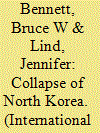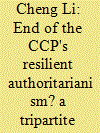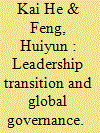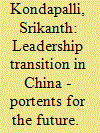|
|
|
Sort Order |
|
|
|
Items / Page
|
|
|
|
|
|
|
| Srl | Item |
| 1 |
ID:
107650


|
|
|
|
|
| Publication |
2011.
|
| Summary/Abstract |
In North Korea, the upcoming leadership transition in the Kim Jong-il regime will be a precarious time for the Kim family's hold on power. A collapse of the North Korean government could have several dangerous implications for East Asia, including "loose nukes," a humanitarian disaster, a regional refugee crisis, and potential escalation to war between China and the United States. To respond to a collapse and these problems, neighboring countries may perform several military missions to stabilize North Korea. These include the location and securing of North Korean weapons of mass destruction, stability operations, border control, conventional disarmament, and combat/deterrence operations. Assuming that collapse occurs in a relatively benign manner, military missions to stabilize North Korea could require 260,000 to 400,000 troops. If collapse occurs after a war on the peninsula, or if it sparks civil war in North Korea, the number of missions-and their requirements-would grow. Because of the size and complexity of these missions, and because of the perils associated with mismanaging them, advance and combined planning is essential. Combined planning should include those actors (e.g., China, South Korea, and the United States) that could otherwise take destabilizing action to protect their own interests.
|
|
|
|
|
|
|
|
|
|
|
|
|
|
|
|
| 2 |
ID:
119179


|
|
|
|
|
| Publication |
2012.
|
| Summary/Abstract |
This essay challenges the widely held view of the CCP's purported "resilient authoritarianism," which asserts that China's one-party political system is able to enhance the state capacity to govern effectively through institutional adaptations and policy adjustments. An analysis of the recent and still unfolding Bo Xilai crisis reveals the flaws in China's political system, including nepotism and patron-client ties in the selection of leaders, rampant corruption, the growing oligarchic power of state-owned enterprises, elites' contempt for the law and the potential failure to broker deals between competing factions in the Party leadership. The essay argues that the CCP's "authoritarian resilience" is a stagnant system, both conceptually and empirically, because it resists much-needed democratic changes in the country. The problems of the resilient authoritarianism thesis is traceable to the monolithic conceptualizing of China - the failure to appreciate seemingly paradoxical transformative trends in the country, which this essay characterizes as three paralleled developments, namely, 1) weak leaders, strong factions; 2) weak government, strong interest groups; and 3) weak Party, strong country. One should not confuse China's national resilience (in terms of the emerging middle class, new interest group politics, and dynamic society) with the CCP's capacity and legitimacy to rule the country. The essay concludes that if the CCP intends to regain the public's confidence and avoid a bottom-up revolution, it must abandon the notion of "authoritarian resilience" and embrace a systematic democratic transition with bold steps towards intra-Party elections, judicial independence and a gradual opening of the mainstream media.
|
|
|
|
|
|
|
|
|
|
|
|
|
|
|
|
| 3 |
ID:
167319


|
|
|
|
|
| Summary/Abstract |
The establishment of the Asian Infrastructure Investment Bank (AIIB) signified China’s ‘charm offensive’ towards multilateral institutions and existing global financial governance. If the rise of China is inevitable, what will the future world look like, and what should other countries be prepared for? Borrowing insights from institutional balancing theory and role theory in foreign policy analysis, this project introduces a ‘leadership transition’ framework to explain policy dynamics in global governance, with the AIIB as a case study. It suggests that China, the United States, and other countries have employed different types of institutional balancing strategies, i.e. inclusive institutional balancing, exclusive institutional balancing, and inter-institutional balancing, to compete for influence and interest in the process of establishing the AIIB. A state’s role identity as a ‘leader’, a ‘challenger’, or a ‘follower’ will shape its policy choices in global governance regarding different institutional balancing strategies in the process of ‘leadership transition.’ Institutional balancing is a new type of balancing among states in the future transformation of global governance. China’s institutional rise in global governance, therefore, might be more peaceful than widely predicted.
|
|
|
|
|
|
|
|
|
|
|
|
|
|
|
|
| 4 |
ID:
117812


|
|
|
| 5 |
ID:
146184


|
|
|
|
|
| Summary/Abstract |
What makes certain dictatorships more likely than others to democratize? I argue that military dictators, as specialists in violence, often remain threats to their successors. However, when democratic systems replace military dictatorships, that expertise presents less danger to new incumbents. Because democracies select leaders through elections, they reduce the importance of military expertise—and the role of associated violence—in contests for office. Thus, military dictatorships should prove more likely to transition quickly to democracy; military dictators will expect a lower likelihood of punishment—including death—at the hands of their successors than if they are replaced by other dictators. Therefore, incumbent military dictators see democratic systems as less dangerous to them; they face specific incentives to ensure a quick and effective transition to democracy. I provide support for my theory with evidence from the post-World War II period.
|
|
|
|
|
|
|
|
|
|
|
|
|
|
|
|
|
|
|
|
|